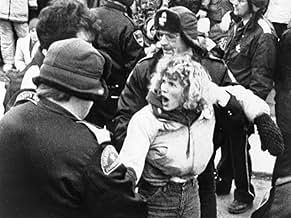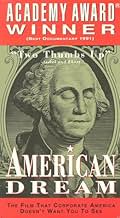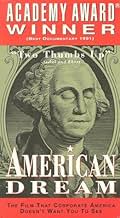IMDb-BEWERTUNG
7,8/10
1086
IHRE BEWERTUNG
Füge eine Handlung in deiner Sprache hinzuRecounts the 1985-86 strike against the Hormel Foods Corporation in Minnesota after its employees' wages and benefits were cut.Recounts the 1985-86 strike against the Hormel Foods Corporation in Minnesota after its employees' wages and benefits were cut.Recounts the 1985-86 strike against the Hormel Foods Corporation in Minnesota after its employees' wages and benefits were cut.
- 1 Oscar gewonnen
- 12 Gewinne & 3 Nominierungen insgesamt
Dan Rather
- Self
- (Archivfilmmaterial)
Ronald Reagan
- Self
- (Archivfilmmaterial)
Empfohlene Bewertungen
American Dream (1990)
**** (out of 4)
Barbara Kopple's Oscar-winning documentary follows a meat packing strike in Austin, MN and those familiar with the director's HARLAN COUNTY, USA will certainly have a lot to compare. This film follows the unions decision to pull their workers after Hormel reported a $29 million dollar profit and then asked their workers to take a pay cut and have their benefits reduced. While this film doesn't reach the same heights as HARLAN COUNTY, there's no question that this here is still a pretty remarkable documentary in its own right. There's no question that Kopple knows how to tell a story and more importantly find the passion, fire and energy of a story and exploit it to make sure the message of those individuals get across for the viewers. The documentary was clearly on the side of the workers as this is where we spend the majority of the running time. The first forty-minutes of the film focuses on the pre-strike as we get to know the main people involved and we get a very good idea of the working conditions in America at the time and it's clear that going on strike is very dangerous for a number of reasons. The final hour of the picture deals with the strike as the workers get dragged along for months and the end results aren't anywhere close to a happy ending. As someone who has worked for a union I can see both sides of the coin but it really does seem that the majority of the people lost here and that's a real shame. Kopple does a remarkable job at telling this story and there's no question that your attention will be glued to the film from start to finish.
**** (out of 4)
Barbara Kopple's Oscar-winning documentary follows a meat packing strike in Austin, MN and those familiar with the director's HARLAN COUNTY, USA will certainly have a lot to compare. This film follows the unions decision to pull their workers after Hormel reported a $29 million dollar profit and then asked their workers to take a pay cut and have their benefits reduced. While this film doesn't reach the same heights as HARLAN COUNTY, there's no question that this here is still a pretty remarkable documentary in its own right. There's no question that Kopple knows how to tell a story and more importantly find the passion, fire and energy of a story and exploit it to make sure the message of those individuals get across for the viewers. The documentary was clearly on the side of the workers as this is where we spend the majority of the running time. The first forty-minutes of the film focuses on the pre-strike as we get to know the main people involved and we get a very good idea of the working conditions in America at the time and it's clear that going on strike is very dangerous for a number of reasons. The final hour of the picture deals with the strike as the workers get dragged along for months and the end results aren't anywhere close to a happy ending. As someone who has worked for a union I can see both sides of the coin but it really does seem that the majority of the people lost here and that's a real shame. Kopple does a remarkable job at telling this story and there's no question that your attention will be glued to the film from start to finish.
It may at times resemble an illustrated Bruce Springsteen protest ballad, but the tragedy in Barbara Kopple's Oscar winning documentary portrait of a Minnesota meat packer's strike is too rich to ignore, not unlike the film 'Roger & Me' but without Michael Moore's self-serving humor. The story begins in the mid 1980s, when the Hormel Company in Austin, Minnesota, tried to lower wages despite showing a healthy profit, leading members of Local P-9 to ignore their parent Union and hire an rhetoric spouting outside agitator (labor 'consultant' Ray Rogers), who transformed their grievance into a noble but ultimately self-defeating grassroots crusade. Kopple herself remains more or less invisible throughout the film, but her sympathy for the renegade P-9 underdogs (and her anti-Reaganomics attitude) is obvious, and she reveals the personal and civic consequences of labor disunion with heartbreaking clarity. The strike itself may not have made headlines outside the Mid West, but the story has some devastating implications for organized labor nationwide, and beyond that supplies enough drama and character to match any Hollywood blockbuster.
I definitely liked this documentary. I usually think of it a little when I see a Hormel product at the grocery store. It was impressively done and it really has an authentic feel to it. For some reason I have not yet seen Harlan County USA, but will certainly do so sometime this year.
I have seen this twice and it is definitely worth more than one viewing. While the tone starts as pro-union, there seems to be at least some hints about their limitations as well later in the film. I spent my childhood in a town nearly 100 miles north of Austin and the film made me appreciative that my father had access to more opportunities when he got laid off (we were much closer to the Minneapolis region than Austin). I could feel for the families of those in Austin during this film as it was primarily a one company town at that time and for all I know it may still be the case.
Documentaries work best when there is a focus on "real" people rather than well known celebrities IMO. This is evidence of that and I recommend this film.
I have seen this twice and it is definitely worth more than one viewing. While the tone starts as pro-union, there seems to be at least some hints about their limitations as well later in the film. I spent my childhood in a town nearly 100 miles north of Austin and the film made me appreciative that my father had access to more opportunities when he got laid off (we were much closer to the Minneapolis region than Austin). I could feel for the families of those in Austin during this film as it was primarily a one company town at that time and for all I know it may still be the case.
Documentaries work best when there is a focus on "real" people rather than well known celebrities IMO. This is evidence of that and I recommend this film.
the most obvious parallel is michael moore's "roger & me." both films look at one community dealing with a corporation's decision to either cut the work force (roger and me) or drastically cut its wages (american dream). michael moore interjects himself into his films a great deal - he is in front of the camera, he uses voice-overs - instead of intertitles - to fill in needed information, etc. some think this is to his detriment, but i think it is honesty...he clearly acknowledges that there is an author and that's a good thing. american dream, on the other hand, attempts to appear objective by choosing to use intertitles and keeping the filmmakers behind the camera. the storytelling and pacing of this film isn't as good as that of "roger and me," but when it comes to documentaries there is room for error in these areas. documentaries ultimately, at least for me, are judged primarily on the story they tell, more than how well they tell it; and i think that's less true for feature films. this film tells a good story. through the film we are able to see the entire process a union undertakes when they have a dispute. if you don't know much about unions then this is a great place to start. if you hate corporations then this will fuel your fire. if you like good documentaries then add this to your list. B.
I was raised in a beef slaughtering plant family in Northeastern Colorado. My father was a member of UFCW Local 7 for many years as well as my brothers and my mother. Watching this movie brought back memories of how life was during strike time. I will hand it to Kopple, about catching the true realities of a plant family on strike. The scenes of the negotiation teams and plant management were excellent, since I didn't get to see what happens behind closed doors, there were guys that told me, but it really hits home when you see it. The scenes of the slaughter, even though my family worked in beef plant and this was a hog plant, I could hear the noise and smell the smells and oddly enough, it was like being back home. This movie brought some tears to my eyes and some bittersweet memories...please e-mail if you have any questions about what life is like on strike...
Wusstest du schon
Top-Auswahl
Melde dich zum Bewerten an und greife auf die Watchlist für personalisierte Empfehlungen zu.
- How long is American Dream?Powered by Alexa
Details
- Erscheinungsdatum
- Herkunftsländer
- Offizieller Standort
- Sprache
- Auch bekannt als
- Американская мечта
- Drehorte
- Produktionsfirmen
- Weitere beteiligte Unternehmen bei IMDbPro anzeigen
Box Office
- Bruttoertrag in den USA und Kanada
- 269.823 $
- Eröffnungswochenende in den USA und in Kanada
- 9.291 $
- 22. März 1992
- Weltweiter Bruttoertrag
- 269.823 $
Zu dieser Seite beitragen
Bearbeitung vorschlagen oder fehlenden Inhalt hinzufügen





















